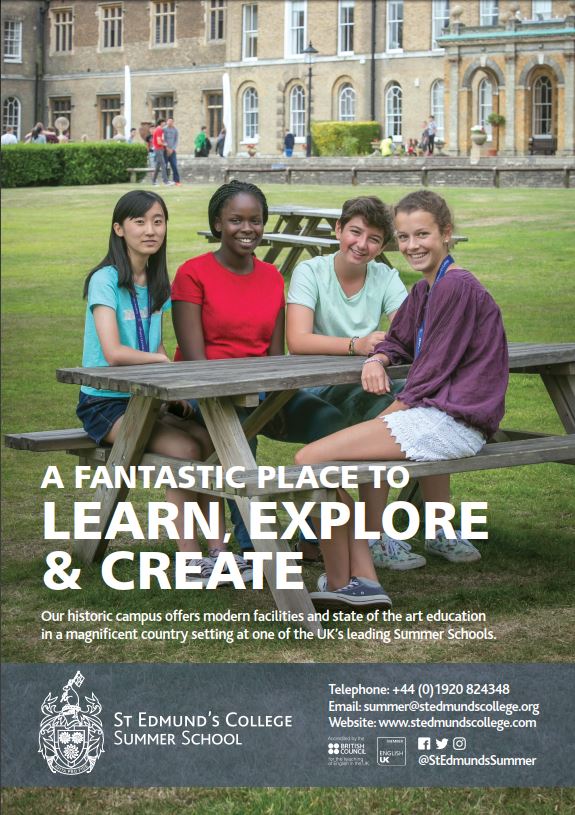Mike Pengelly believes it’s time to change the traditional summer school business model
This was the summer that summer school didn’t happen. Day camps did well with local kids in southern Europe, a few students made it to Malta, but Covid-19 put paid to most language travel.
For Mike Pengelly, new summer school director at St Edmund’s College, one of our top-ranking boarding school providers, it was a dramatic introduction to his new role.
Coming from a background of running university events and summer schools, he was shocked by the homogeneity of the sector.
“Locales, quality and prices vary dramatically but the business model remains the same – English language content mixed with off-site excursions and on-site activities with the focus very much centred on the English language sessions,” he told us.
“The reliance on one market, one product and one business model is incredibly risky and, in my opinion, bad business.”
His conclusion after Covid-19 is that, “A more modern, diverse and (dare I say it) commercial attitude is needed if many of these summer schools are to survive.”
Most providers see the product as the language courses, but for Pengelly summer schools are “complex ‘events’ with far more moving parts than just classes.”
He reels off the areas. There are staff recruitment and training, off-site excursions, on-site activities, pastoral care and a 24/7 programme. Not to mention marketing and recruitment campaigns.
“The idea that the classroom rules this scenario is naïve and outdated.”
Covid-19 showed that too many summer schools have ignored the importance of mitigating risk or realised that to avoid losses you need to spread your risk.
“The old proverb of ‘don’t put all of your eggs in one basket’ seems incredibly pertinent,” he points out.
This principle should seep into every aspect of a summer school. Using agents as an example, Pengelly asks, “would you rather one agency sends you thirty students or five agencies each send you six students?”
“If that one agency goes out of business or is based in a country that can’t fly to the UK due, for example, to Covid-19, that’s a substantial drop in student numbers and a big ‘hole’ in your budget.”
“The reliance on one market, one product and one business model is incredibly risky and, in my opinion, bad business.”
Spreading the risk also means increasing the range of products. Why only offer an English language course when you could add day camps for UK students, online options, sports camps, and more.
Pengelly is clear that, “Limiting the reliance on one core market, one product and (to be blunt) overseas students, needs to happen if we’re to remain competitive and viable post-pandemic.”
“After over 15 years in the education sector and 10 years building, then running multiple summer schools, the single most recurring piece of student feedback I have seen every year, in every course and from every nationality is simply, “I want to meet more students from more countries,” says Pengelly.
Residential summer schools usually last for weeks, which enables a student community to form. Even if students attend different academic courses, so many elements are shared – accommodation, meals, excursions – that all students can benefit from the truly multicultural nature of these programmes.
As well as the obvious ‘student-experience’ and social benefits, the opportunity for English language learners to mix with native English speakers every day will have a hugely positive impact on their language skills and their confidence.
And then there are the business benefits. “Opening your doors to native English speakers just increased the potential customer base for you and your recruitment agents by millions!”
Of course, Pengelly works for a British boarding school. Such schools have huge appeal, and are, palatial campuses surrounded by lush green playing fields, historic buildings perfect for those social media selfies, plus they are usually situated away from busy cities in a self-contained environment where parents can feel confident of their child’s safety.
In this new Covid-19 world, the perceived safety of self-contained boarding schools is an obvious advantage and ultimately a huge selling point.
“Maybe I’m doing summer schools a disservice by suggesting they haven’t ‘moved with the times’, aren’t commercial enough and are slow to adapt to change,” admits Pengelly. “Some providers do offer a variety of options for their students and Covid-19 has caused many to now offer online courses, too.”
Ultimately, he believes the coronavirus pandemic has shone a light on the summer school sector and sped up the evolution of the sector.
“One thing I do know for sure is that the summer school status quo has ended and the St Edmund’s College Summer School will be stepping out of the crowd to offer more diverse and modern choices to its customers,” says Pengelly.
Will other summer schools follow his lead?







